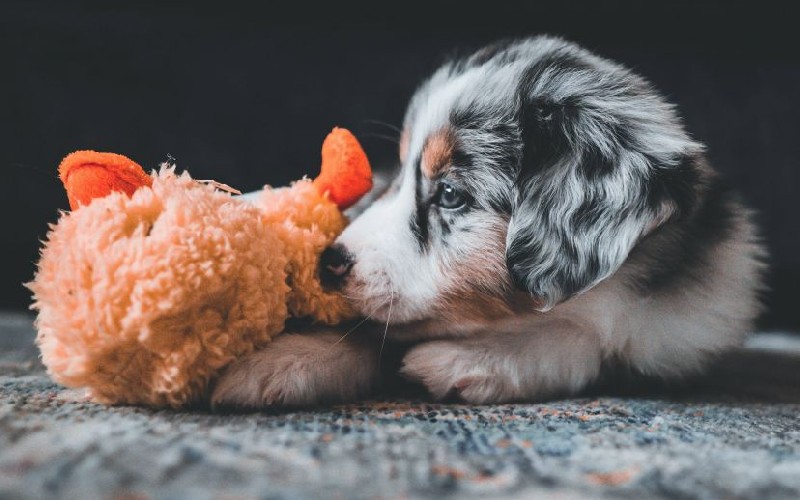
A Vet’s Guide to Bringing Home a New Puppy
Congratulations on bringing home a new puppy! This is such an exciting time, filled with fun, joy, and new experiences. As a new puppy parent, you'll also want to make sure you're ready to provide your little furball with the best care possible. This guide will walk you through everything you need to know to ensure a healthy and happy start to your puppy's new life!1. Puppy-Proof Your Home
Puppies are naturally curious, and they'll want to explore every nook and cranny of their new home. Before bringing your new puppy home, remove any hazards like electrical cords, toxic plants, or small objects they could swallow. Create a safe, puppy-friendly space where they can explore and play without getting into trouble!
2. First Vet Visit
Your puppy’s first vet appointment should be scheduled within the first week of bringing them home. During this visit, expect a thorough physical exam, vaccinations, and a discussion about preventative care like flea, tick, and heartworm treatments. Don’t forget to bring any paperwork you received from the breeder or shelter so your vet can review your puppy’s health history.
3. Vaccination Schedule
To keep your puppy safe from illnesses like distemper, parvovirus, and rabies, they will need a series of vaccinations starting from 6-8 weeks of age and continuing through 16-18 weeks. Following your vet's recommended vaccination schedule will help ensure your puppy stays healthy and happy.
4. Nutrition
Providing your puppy with the right nutrition is key to their growth and development. Start them on a high-quality, balanced diet suitable for their breed and size. Many breeders recommend keeping your puppy on the same diet they were on with their mother to ease the transition and avoid any tummy troubles. This ensures they continue to get the nutrients they're familiar with. As your puppy grows, consult your vet about when to transition to a new food and what diet will best support their future development.
Need help finding the right diet?
Connect With Us
5. Puppy Socialization
The early weeks are a prime time for socialization! Make sure to introduce your puppy to new people, places, sounds, and other pets in a controlled and positive way. This helps your puppy grow up to be confident and well-adjusted. Puppy classes can also be a fun way to teach basic commands while giving your puppy valuable social skills.
6. House Training
House training your puppy takes patience and consistency. Start with a regular schedule of bathroom breaks, especially after meals or naps, and always reward your puppy with treats or praise when they go in the right spot. Crate training can also be helpful, providing a safe space for your puppy and making house training easier.
7. Exercise & Play
Puppies are bundles of energy! Daily play and exercise are essential for their physical and mental development. Walks, toys, and interactive games will keep your puppy active and happy. But remember, while they need plenty of activity, don’t overdo it—young puppies have growing bones and joints, so avoid excessive running or jumping.
8. Teething & Chewing
As your puppy begins teething, they will naturally want to chew on things. Providing safe chew toys will help keep your belongings intact while soothing your puppy’s gums. Teething is a natural process, so encourage good chewing habits early.
9. Grooming Routine
Start your puppy’s grooming routine early! Regular brushing, nail trimming, and bathing should become part of your puppy’s care routine. Getting them used to being handled will make future grooming much easier. Talk to your vet or groomer about breed-specific needs.
10. Training & Commands
Basic obedience training is essential for your puppy’s safety and your peace of mind. Start with simple commands like “sit,” “stay,” and “come,” and always use positive reinforcement with treats and praise to encourage good behavior. Consistent training helps build a strong bond between you and your puppy.
11. Health Monitoring
Keep an eye on your puppy’s behavior, eating habits, and weight. If you notice anything unusual like lethargy, loss of appetite, vomiting, or diarrhea, reach out to your vet right away. Regular check-ups are essential to ensure your puppy is growing and staying healthy.
12. Spaying or Neutering
Spaying or neutering your puppy at the right time can prevent unwanted litters and has health benefits like reducing the risk of certain cancers or behavioral issues. Consult your vet on the best time to schedule this procedure for your puppy.
13. Farmina Pet Health Coaching
At Farmina, we offer a personalized Pet Health Coaching service to guide you through your puppy’s nutrition journey. Our health coaches work with you to create a tailored plan for your puppy’s diet, helping you choose the best products to support their growth, energy levels, and overall health. Whether you have questions about transitioning to new food or ensuring they get the right nutrients, our team is here to support your puppy’s long, healthy life. Contact us to learn more!
Puppy Essentials Checklist
- Puppy food (same diet as the breeder is feeding)
- Food and water bowls
- Crate (for house training and safe space)
- Bedding for crate
- Adjustable collar and sturdy leash
- ID tag with your contact information
- Chew toys (safe for teething)
- Interactive toys for mental stimulation
- Brush/comb for grooming
- Puppy shampoo
- Nail clippers
- Toothbrush and puppy-safe toothpaste
- Puppy pads (for house training)
- Enzymatic cleaner (for accidents)
- Blanket or toy from breeder (familiar scents)
- Flea, tick, and heartworm prevention
- First-aid kit (for minor injuries)
- Vaccination records (for vet visits)
Connect With a Pet Health Coach

